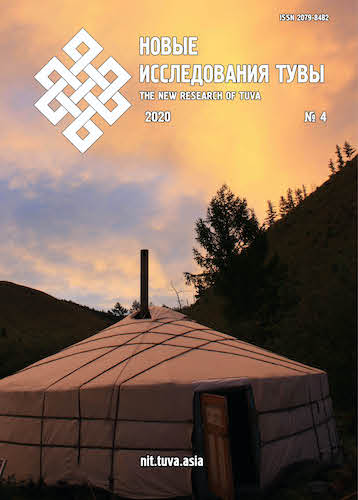Tuva in the cultural dialogue: a comparative context
DOI:
https://doi.org/10.25178/nit.2020.4.15Keywords:
Tuva; Tuvan culture; cultural dialogue; cross-cultural dialogue; cross-cultural communication; cross-cultural interaction; Uryankhai issue; Tuvan issueAbstract
The article brings up the problem of cultural dialogue problem in global and regional aspects and focuses on the issue topical for comparative Tuvan studies – the one of positioning Tuva in the cultural dialogue within a comparative context. According to O. Spengler, culture can be seen as a separate social system in its specific historical peculiarity. This very concept allows us to discuss the culture’s ability of culture to enter and conduct a dialogue.
We have reason to speak about the dialogue of cultures only if there is a meaningful and constructive exchange of speech and information going on. To engage in this, a culture has to be a speaking and non-silent one, and have the ability to speak not in monologues, but in dialogues. In its colloquial form, the culture has to be subject-oriented, attracted by the subjectness of another culture in its unique objective value.
The comparative analysis of the situation traditional Tuvan culture finds itself in leads us to a number of conclusions. Firstly, by the criterion of openness to dialogue, it can be classified as a relatively closed culture. By the criterion of dialogue selectivity, Tuvans can be characterized as predominantly Asian-oriented; on the scale between “speaking” and “silent” cultures, Tuvan culture tends to be seen as silent, and it can be referred to as more monologue-like than dialogue-like.
The current spread of contemporary networks and digitalization of public and personal life contribute to the changes in Tuva’s position in the cultural dialogue. At the same time, we believe that Tuvans will only benefit from cultivating a respectful and keen attitude to their own culture and from a better understanding of its details.
References
Adygbai, Ch. O. (2012) Dialog tuvinskoi i zapadnoi kultur (na primere zhizni uchenogo Ondara Daryma) [Dialogue of Tuvan and Western cultures, as exemplified by the scientist Ondar Daryma’s life]. New Research of Tuva, no. 2, [online] Available at: https://nit.tuva.asia/nit/article/view/316/ 627 (access date: 06.10.2020). (In Russ.).
Balakina, G. F. and Anaiban Z. V. (1995) Sovremennaia Tuva: sotsiokul'turnye i etnicheskie protsessy [Contemporary Tuva: socio-cultural and ethnic processes]. Novosibirsk, Nauka, Sib. izd. firma. 137 p. (In Russ.).
Bakhtin, M. M. (1979) Estetika slovesnogo tvorchestva [Aesthetics of verbal art]. Moscow, Iskusstvo. 424 p. (In Russ.).
Begzi, A. D. (2011) Budet li ekonomika Sibiri prirastat Tuvoi? «Novaia industrializatsiia» Sibiri i problemy ekonomicheskogo razvitiia Tuvy [Will the economy of Siberia grow by Tuva? «New industrialization» of Siberia and problems of Tuva's economic development]. New Research of Tuva, no. 1 [online] Available at: https://nit.tuva.asia/nit/article/view/438 (access date: 06.10.2020). (In Russ.).
Bibler, V. S. and Akhutin, A. V. (2010) Dialog kultur [Dialogue of cultures]. In: Novaia filosofskaia entsiklopediia [New Encyclopedia of Philosophy]: in 4 vols. Moscow, Mysl. Vol. 1. 744 p. Pp. 659–661. (In Russ.).
Vasilenko, V. A. (2015) «Uriankhaiskii vopros» v mezhdunarodnoi politike Rossii, Mongolii, Kitaia (pervaia chetvert ХХ veka): istochnikovedenie i istoriografiia problemy [The Uriankhai issue in the international politics of Russia, Mongolia, and China in the first quarter of the twentieth century: source studies and historiography of the problem]. In: Rossiia i Mongoliia v pervoi polovine XX veka: kontseptualnye voprosy rossiisko-mongolskikh otnoshenii (diplomatiia, ekonomika, nauka) [Russia and Mongolia in the first half of the twentieth century: conceptual issues of Russian-Mongolian relations (diplomacy, Economics, science)]. Ulan-Bator, Irkutsk, Izd-vo BGU. 416 p. Pp. 99–114. (In Russ.).
Vinokur, T. G. (1998) Dialogicheskaia rech [Dialogic speech]. In: Yazykoznanie. Bolshoi entsiklopedicheskii slovar [Linguistics: A Large Encyclopaedic Dictionary]. Ed. by V. N. Yartseva. Moscow, Bolshaia Rossiiskaia entsiklopediia. 685 p. P. 135. (In Russ.).
Golovnev, A. V. (1995) Govoriashhie kultury: traditsii samodiitsev i ugrov [Talking cultures: Samoyed and Ugrian traditions]. Ekaterinburg, UrO RAN. 606 p. (In Russ.).
Dampilova, L. S. (2016) Tiurkomongolskie istoki v sovremennoi poiezii narodov Sibiri [Turkic and Mongolian sources of the modern poetry of the peoples of Siberia]. In: Mongolica-XVI [Mongolica-XVI]. St. Petersburg, Peterburgskoe vostokovedenie. 104 p. Pp. 44–50. (In Russ.).
Emelianov, V. V. (2012) Shumerskaia literatura [Sumerian literature]. In: Literatury stran Azii i Afriki. Nachalnyi period razvitiia [Asian and African Literatures. The earliest period]. Ed. by V. V. Emelianov. St. Petersburg, IPK «NP-Print». 348 p. Pp. 31–108. (In Russ.).
Zhbankov, M. R. (2001) Dialog kultur [Dialogue of cultures]. In: Vsemirnaia entsiklopediia: Filosofiia [World entsyclopedia: Philosophy]. Ed. by A. A. Gritsanov. Moscow, ACT, Minsk, Harvest, Sovremennyi literator. 1312 p. Pp. 308–309. (In Russ.).
Kan, V. S. (2010) Chego zhdut ot stroitel'stva zheleznoi dorogi i osvoeniia mestorozhdenii zhiteli Tuvy (po materialam sotsiologicheskikh issledovanii 2008–2010 gg.) [What the residents of Tuva expect from the construction of the railway and the development of minerals (based on the materials of sociological research in 2008-2010)]. New Research of Tuva, no. 4, [online] Available at: https://nit.tuva.asia/nit/article/view/477 (access date: 06.10.2020). (In Russ.).
Kolomiets, N. V. (2012) Sovremennyi kontsept tipologii kultury [The contemporary concept of typology of culture]. Gosudarstvennoye i munitsipalnoye upravlenie , no. 4, pp. 7–12. (In Russ.).
Kosarskaya, E. S. (2015) Tipologiia kul'tury kak simvolicheskaia borba za samoidentichnost [Typology of culture as a symbolic struggle for self-identity]. Culture and education, no. 4, pp 42–48. (In Russ.).
Kuzmin, S. (2018) Urianhaiskii vopros i mongolo-tuvinskie otnosheniia v nachale ХХ v. [The Uriankhai issue and Mongolia-Tuva relations in early 20th Century]. Oriental Studies, no. 3, pp. 2–14. (In Russ.). https://doi.org/10.22162/2619-0990-2018-37-3-2-14
Lamazhaa, Ch. K. (2011) Tuva mezhdu proshlym i budushchim [Tuva between the past and the future]. 2nd ed. St. Petersburg, Aleteiia. 368 p. (In Russ.)
Lamazhaa, Ch. K. (2018) Natsionalnyi kharakter tuvintsev [The national character of Tuvans]. Moscow, St. Petersburg , Nestor-Istoriia. 240 p. (In Russ.).
Larchenko, S. G. and Eremin, S. N. (1991) Mezhkulturnye vzaimodeistviia v istoricheskom protsesse [Intercultural interactions in the historical process]. Novosibirsk, Nauka. 174 p. (In Russ.).
Lotman, Yu. M. (2010) Semiosfera [Semiosphere]. St. Petersburg, Iskusstvo – SPb. 704 p. (In Russ.).
Maadyr, M. S. (2018) SShA i Tuvinskaia Narodnaia Respublika: voprosy knigoobmena [The USA and Tuvan People’s Republic: issues of book exchange (from the documents at the State Archives of the Republic of Tuva)]. Bibliosfera [Bibliosphere], no. 2, pp. 24–27. (In Russ.). DOI: https://www.doi.org/10.20913/1815-3186-2018-2-24-27
Molerov, N. M. and Mart-ool, V. D. (2013) «Uriankhaiskii vopros» v politicheskoi istorii Rossii: vozniknovenie i dolgovremennaia aktual'nost' [The “Uriankhai issue” in the political history of Russia, its emergence and long-term relevance]. Abakan, Kooperativ «Zhurnalist». 244 p. (In Russ.).
Mongush, M. V. (2008) Tuva: dialog kultur v proshlom i nastoiashhem [Tuva: Dialogue of cultures in the past and present]. Sovremennye problemy servisa i turizma [Contemporary problems of service and tourism], no 4, pp. 10–26. (In Russ.).
Ornatskaia, L. A. (2014) Mezhkulturnyi dialog: problemy i perspektivy issledovaniia [Intercultural dialogue: problems and prospects of studies]. Vestnik of St.-Petersburg University, ser. 6, issue 1, pp. 48–60. (In Russ.).
Otroshhenko, I. V. (2017) Vhozhdenie Tuvy v sostav SSSR: alternativnye mneniia [Tuva’s accession to the USSR: Alternative opinions]. New Research of Tuva, no. 4, pp. 36–74. (In Russ.). DOI: www.doi.org/10.25178/nit.2017.4.3
Otroshhenko, I. V. (2020) «Mongolofilstvo» politicheskoi ielity Tuvinskoi Narodnoi Respubliki [“Mongolophilia” of the political elite in the Tuvan People’s Republic]. New Research of Tuva, no. 3, pp. 35–48. (In Russ.). DOI: www.doi.org/10.25178/nit.2020.3.3
Popkov, Yu. V. and Tyugashev, E. A. (2019) Prostranstvennyi obraz Tuvy v obiektive sotsiokulturnoi fenomenologii [The spatial image of Tuva in the focus of sociocultural phenomenology]. New Research of Tuva, no. 3, pp. 4–14. (In Russ.). DOI: www.doi.org/10.25178/nit.2019.3.1
Popkov, Yu. V., Tyugashev, E. A. and Kostyuk, V. G. (2006) Etnosocialnye processy v sovremennoi Evrazii: istoriia i sovremennost [Ethnosocial processes in modern Eurasia: history and modernity]. In: Etnosotsialnye processy v Sibiri [Ethnosocial processes in Siberia]. Ed. by Yu. V. Popkov. Novosibirsk, Sibirskoe Nauchnoe Izdatelstvo. 230 p. Vol. 7. Pp. 12–31. (In Russ.).
Popov, E. N. (2005) Suschnostnye harakteristiki dialoga v sovremennoi filosofii [The nature of dialogue contemporary philosophy]. Bulletin of the Yakut state University, vol. 1, pp. 69–74. (In Russ.).
Samdan, A. A. O. (2019) Rossiiskii i tuvinskii varianty resheniia «urianhaiskogo voprosa» (1911–1916 gg.) [Russian and Tuvan options for resolving the uryanhay issue (1911–1916)]. In: Uchenye zapiski. Tuvinskii institut gumanitarnykh i prikladnykh sotsialno-ekonomicheskikh issledovanii pri Pravitel’stve Respubliki Tyva. Vol XXV. Ed. by B. A. Dongak. Kyzyl, Typography MBOU SCB “Aniak”. 452 p. Pp. 34–55. (In Russ.).
Skiperskikh, A. V. (2018) Ofitsialnoe i neofitsialnoe iskusstvo v «molchashchei» kulture: vzgliad nonkonformistov [Official and unofficial art in the «silent» culture: A nonconformist view]. International journal of cultural studies, no. 1, pp. 189–197. (In Russ.).
Tetdoeva, S. A. (2010) Dialog kak forma kommunikatsii v sfere mezhkulturnykh kontaktov [Dialogue as a form of communication in the field of intercultural contacts]. Proceedings of the St. Petersburg State University of culture and arts, vol. 190, pp. 185–190. (In Russ.).
Tulchinskii, G. L. (2015) Filosofiia kak paradigma mezhkulturnogo dialoga [Philosophy as a paradigm of intercultural dialogue]. Russian Journal of Philosophical Sciences, no. 11, pp. 148–154. (In Russ.).
Thagapsoev, H. G., Astaf'eva, O. N., Dokuchaev, I. I., and Leonov, I. V. (2020) Informatsionno-semioticheskaia teoriia kultury [Information and semiotic theory of culture]. St. Petersburg, Asterion. 208 c. (In Russ.).
Tyugashev, E. A. (2019) O. Shpengler i sociokulturnyi podhod [O. Spengler and the sociocultural approach]. In: Tezaurusy i problemy kultury [Thesauri and the problem of culture]. Ed. by Val. A. Lukov. Moscow, Moscow University for the Humanities Publ. 401 p. Pp. 272–281. (In Russ.).
Tyugashev, E. A. and Popkov, Yu. V. (2017) Mentalitet tuvintsev v gorizonte sotsiokulturnoi fenomenologii Pitirima Sorokina [Mindset of Tuvans in terms of Pitirim Sorokin’s cultural phenomenology]. New Research of Tuva, no. 3, pp. 4–17. (In Russ.).DOI: https://doi.org/10.25178/nit.2017.3.1
Khomushku, Yu. Ch. (2002) Protsessy sblizheniia i vkhozhdeniia Tuvinskoi Narodnoi Respubliki v sostav SSSR: 20–40-e gody XX v. [Process of rapprochement and accession of the Tuvan People's Republic in the USSR: 1920s–1940s]: Abstract of Diss. ... Candidate of History. Moscow. 18 p. (In Russ.).
Yarkova, E. N. (2012) Strategii mezhkulturnoi kommunikacii: Ot monologa k dialogu [Intercultural communication strategies: From monologue to dialogue]. Bulletin of the Ishim Pedagogical Institute named after P. P. Yershov, no 1, pp. 64–70. (In Russ.).
Aman, R. (2012) The EU and the Recycling of Colonialism: Formation of Europeans Through Intercultural Dialogue. Educational Philosophy and Theory, no. 44 (9), pp. 1010–1023.
Chanchani, Sh. and Shantapriyan, P. (2009). Typologies of Culture. SSRN Electronic Journal. 30 July. DOI: http://dx.doi.org/10.2139/ssrn.1441609
Cliche, D. and Wiesand, A. (2009) Achieving Intercultural Dialogue through the Arts and Culture? Concepts Policies Programmes Practices. D'Art Topics in Arts Policy, no. 39, pp. 5–46.
Igbino, J. (2011) Intercultural Dialogue: cultural dialogues of equals or cultural dialogues of unequals? Policy Futures in Education, vol. 9, no. 1, pp. 57–65.
Karelina, E. K. (2018) The Problematic Aspects of Cultural Policy in Modern Tuva. Journal of Siberian Federal University. Humanities & Social Sciences, no. 11, pp. 218–226.
Leeds-Hurwitz, W. (2014) Intercultural dialogue. Key Concepts in Intercultural Dialogue, no. 1 [online] Available at: https://centerforinterculturaldialogue.files.wordpress.com/2014/02/key-concept-intercultural-dialogue1.pdf (access date: 06.10.2020).
Leeds-Hurwitz, W. (2015) Intercultural dialogue. In: International encyclopedia of language and social interaction. Ed. by K. Tracy, C. Ilie and T. Sandel. Boston, John Wiley & Sons. Vol. 2, Pp. 860–868. DOI: 10.1002/9781118611463/wbielsi061
Published
How to Cite
Попков Ю. В., Тюгашев Е. А. Тува в диалоге культур: компаративистский контекст // Новые исследования Тувы. 2020, № 4. С. 217-229. DOI: www.doi.org/10.25178/nit.2020.4.15
For citation:
Popkov Yu. V. and Tyugashev E. A. Tuva v dialoge kul'tur: komparativistskii kontekst [Tuva in the cultural dialogue: a comparative context]. New Research of Tuva, 2020, no. 4, pp. 217-229. (In Russ.). DOI: www.doi.org/10.25178/nit.2020.4.15
Issue
Section

This work is licensed under a Creative Commons Attribution-NonCommercial 4.0 International License.

Author(s) license holder(s) grant rights for their work to the journal (grantee of a license) under the simple non-exclusive open license in accordance with Art. 1286.1 «Open license for a research work, work of literature or fine arts», Civil Code of the Russian Federation.
New Research of Tuva publishes articles under the Creative Commons Attribution-NonCommercial license (CC BY-NC).
Since it is an open license, author(s) reserve the right to upload the article to their institutional repository, submit it to another journal (if it allows republications), or republish it on their own website (in full, or in part).
However, several conditions apply here:
a) The republished version must always contain the name(s) and affiliation(s) of the author(s), the original title and the hyperlink to the original version on the New Research of Tuva website;
b) It must be in open access, free of charge, and no category of readers must be in any way whatsoever advantaged over general readership.
c) should the contribution be submitted elsewhere by its author(s) without substantial modification (30% or more of original text unchanged), the body of the article should contain a disclaimer that the original version was published in New Research of Tuva (with a link to the respective page)
The CC-BY-NC is a non-revocable license which applies worldwide and lasts for the duration of the work’s copyright.










